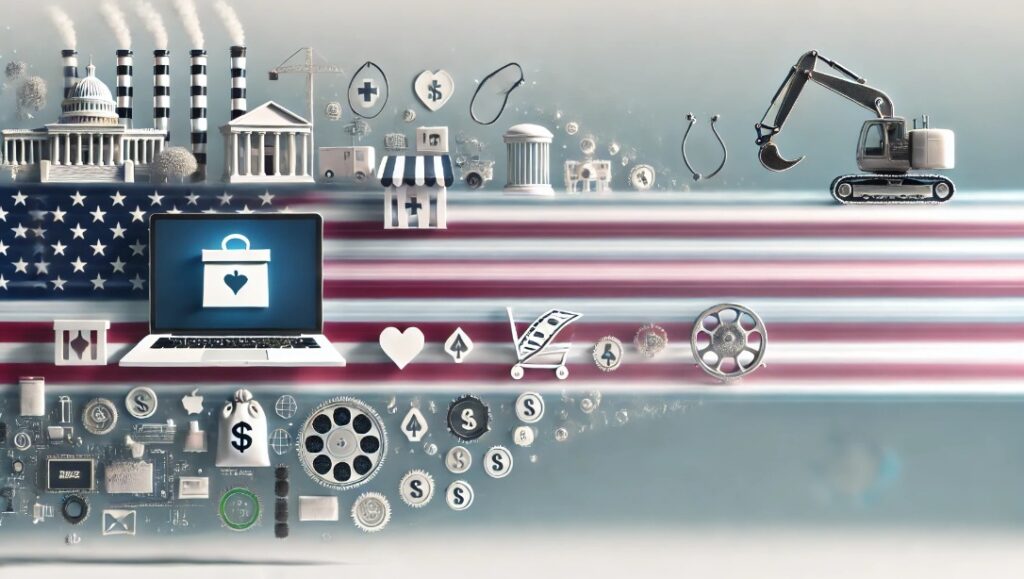Technology has become an essential part of American life, influencing every industry, business, and people. From shopping and entertainment to finance, production, and plants, technological innovations are making significant changes across the board. This digital revolution isn’t just a passing fad; it’s a profound transformation that fundamentally changes the American economy and society.
E-commerce Revolutionizing Retail
E-commerce has moved beyond its revolutionary beginnings and is now an integral part of everyday life. What started as a novel way to shop has become the norm, with consumers expecting not just convenience but also speed, personalization, and a seamless experience across all platforms. Today, the lines between online and physical shopping are increasingly blurred, with retailers offering integrated experiences where customers can order online and pick up in-store or use apps to check inventory in real-time. Giants like Amazon continue to lead, but many traditional retailers have caught up, leveraging technology to provide fast delivery, personalized recommendations, and competitive pricing. This evolution in e-commerce is not just about convenience; it’s about creating a shopping experience that meets the modern consumer’s demand for efficiency, choice, and flexibility.
Telemedicine Changing Healthcare Delivery
Healthcare is another sector experiencing significant transformation through technology. Telemedicine, which once seemed like a distant possibility, is now a reality for millions of Americans. Patients can consult with doctors, receive diagnoses, and even get prescriptions—all without leaving their homes. This shift has been especially important in distant areas, where access to healthcare services can be limited. The convenience of telemedicine services has also led to increased patient engagement and adherence to treatment plans. However, this evolution comes with challenges, including ensuring patient data security and navigating varying state regulations.
Streaming Services Disrupting Traditional Media
The development of streaming services has completely reversed the media landscape. Platforms like Netflix, Hulu, and Disney+ have changed how Americans consume entertainment. Traditional television, which used to be a center of family living rooms, is now often viewed as outdated. Streaming services offer on-demand content, personalized recommendations, and the freedom to watch anytime, anywhere. This shift has not only changed viewing habits but also impacted the advertising industry and led to a surge in original content production. As consumers increasingly cut the cord, traditional media companies are doing their best to adapt. For example, many are launching their own streaming platforms to stay relevant in this digital age.
Digital Entertainment Evolution
The entertainment industry is changing significantly, too, and this can be observed on all online entertainment platforms, including online casinos, that actually are a prime example of the evolution of digital entertainment. We still remember the times when casinos were strictly connected to their physical locations in Las Vegas or Atlantic City; casinos have now entered the digital world, accessible from any device with an internet connection. The convenience and accessibility of online casinos have attracted a new generation of players, rapidly growing in popularity. This digital shift and rise of these digital entertainment platforms has also opened up opportunities for innovative game design, integrating virtual reality and live dealer games to create immersive experiences. However, the rise of online casinos has also prompted discussions around regulation, responsible gaming, and the impact on traditional brick-and-mortar establishments.
Fintech Innovations in Banking and Finance
Fintech has moved from being a disruptive force to becoming a central pillar of the financial industry. What once seemed like cutting-edge innovation—mobile banking apps, peer-to-peer payment platforms, and digital-only banks—has now become standard. Today, the focus is on refining these technologies to offer even greater convenience, security, and personalization. Artificial intelligence and machine learning are no longer just enhancing fraud detection; they are now integral to creating hyper-personalized financial services, offering real-time insights, and optimizing investment strategies. The rise of decentralized finance (DeFi) and blockchain technology is pushing the boundaries further, challenging traditional financial systems to evolve and adapt.
AI and Automation in Manufacturing
Manufacturing in the U.S., a vital part of the economy, is going through significant changes thanks to artificial intelligence (AI) and automation. More and more, robots and AI systems are taking over tasks that humans used to do, which helps businesses work faster and save money. However, this shift has its challenges, such as worries about job losses and the need for workers to learn new skills. On the bright side, AI and automation are opening up new possibilities for innovation and economic growth. By making production more efficient, reducing mistakes, and allowing for more customized products, technology is shaping the future of American manufacturing.
The Impact on Business Models, Consumer Behavior, and Regulations
These technological shifts are not just changing how industries operate; they are also redefining business models, consumer behavior, and regulatory frameworks. Companies are increasingly adopting digital-first strategies, focusing on online engagement and data-driven decision-making. Consumers, in turn, have become more empowered, with greater access to information and a wider range of choices. This has led to a demand for more personalized experiences, pushing businesses to innovate continuously.
However, with these developments, industries are facing new challenges. Regulatory bodies are tasked with keeping pace with the rapid changes, ensuring that innovation does not outstrip the ability to protect consumers and maintain fair competition. Issues such as data privacy, cybersecurity, and ethical AI use are the questions to be raised in the upcoming regulatory discussions.
Conclusion
The digital revolution is reshaping American industries in profound ways, driving innovation and creating new opportunities. From retail to healthcare, media to manufacturing, and finance to entertainment, technology is transforming the way we live and work. As businesses and consumers navigate this new landscape, it is clear that the future will be defined by how well we adapt to and harness the power of technology. The journey has just begun, and the possibilities are endless.


